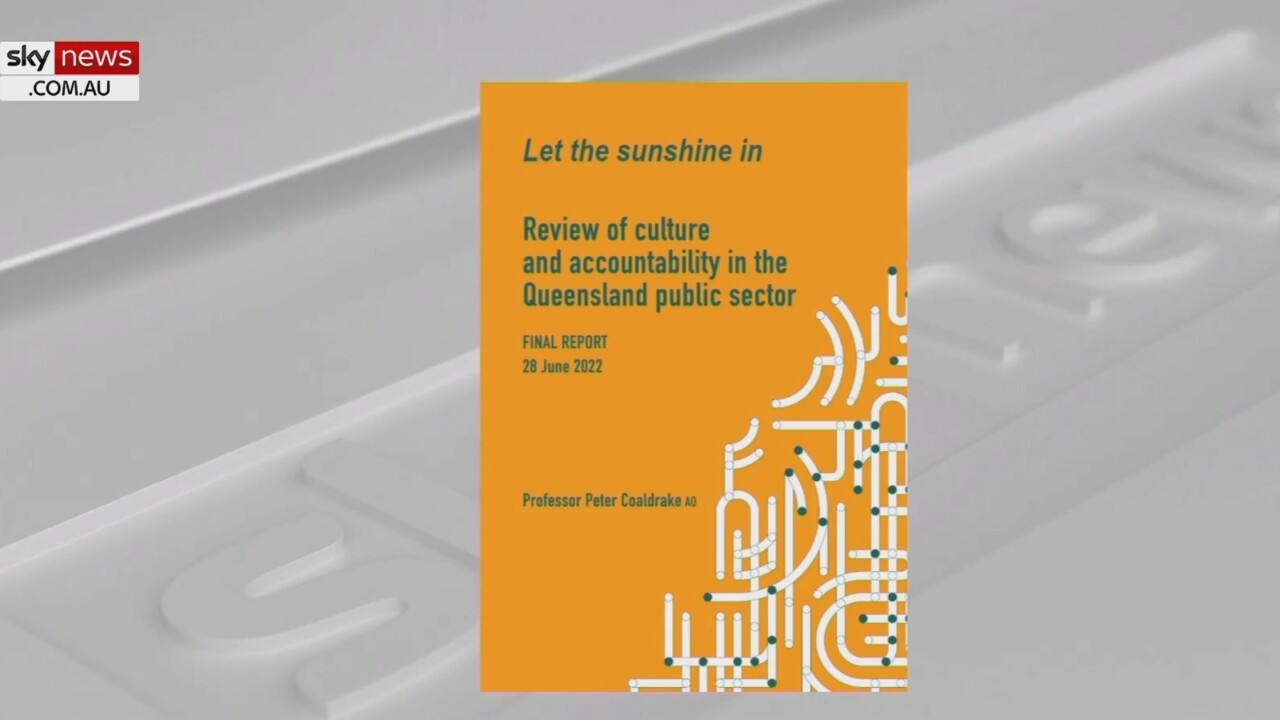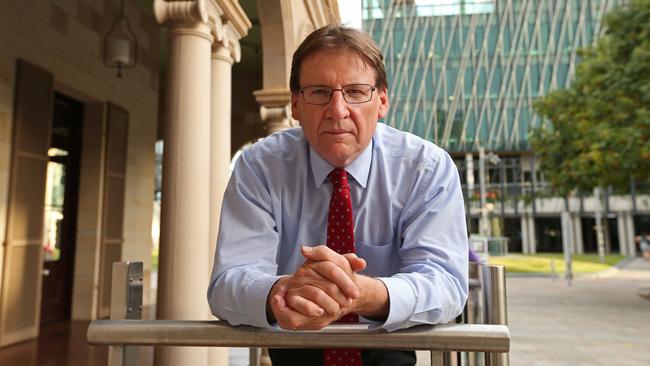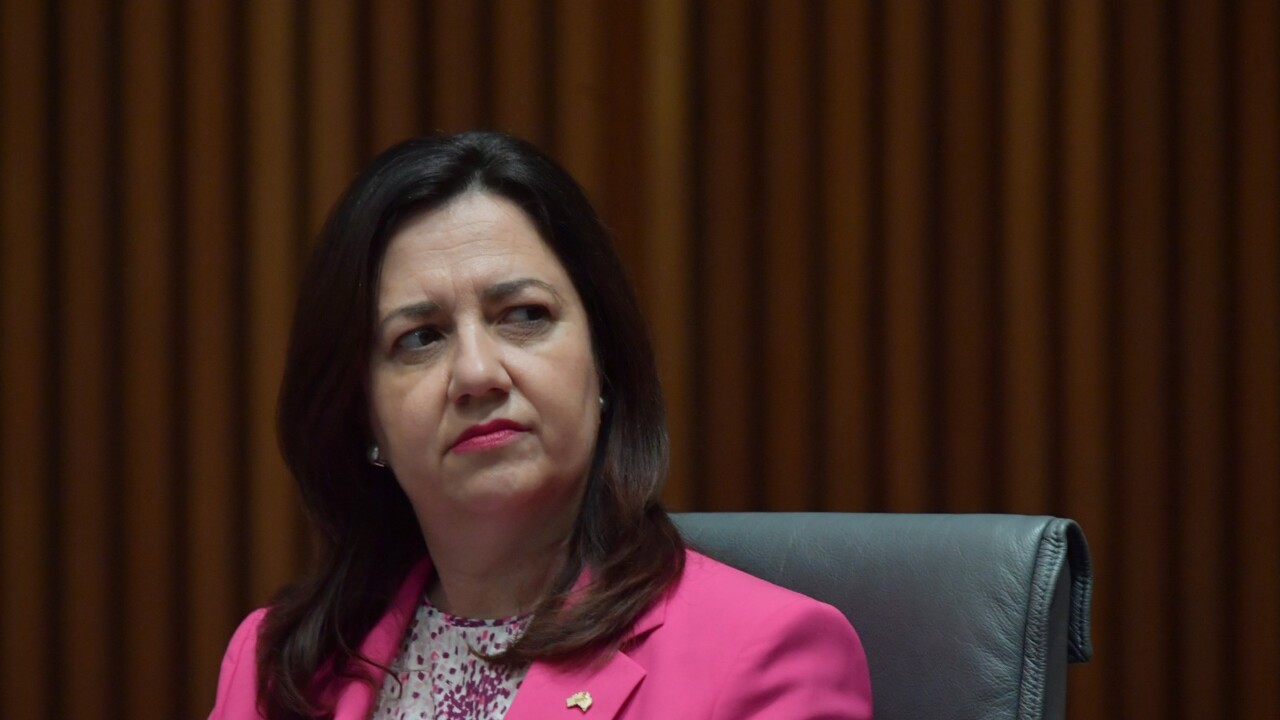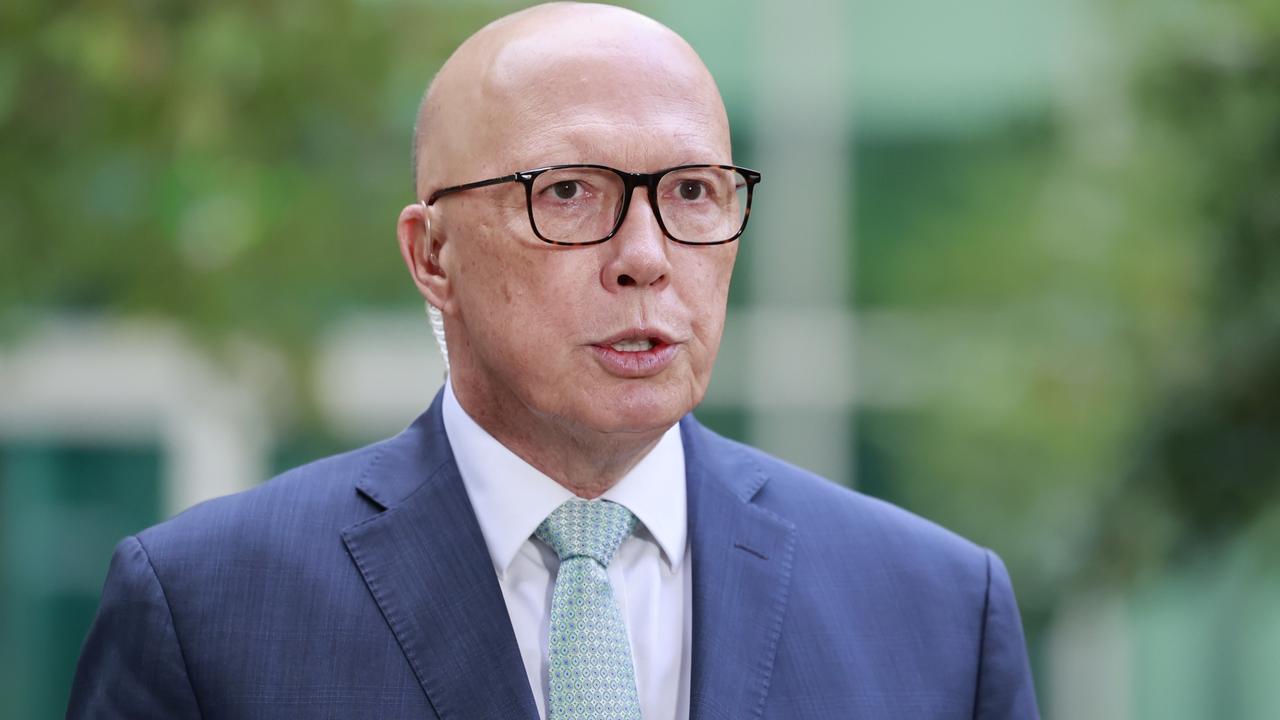Scathing Coaldrake report blasts culture within Palaszczuk Government, calls for major overhaul
The Opposition is continuing calls for a royal commission in the wake of Peter Coaldrake’s report on the Palaszczuk government’s integrity, as a senior minister said it “must do better”.

QLD Politics
Don't miss out on the headlines from QLD Politics. Followed categories will be added to My News.
Queensland’s rotting public service and murky political processes must be overhauled to improve confidence in the Palaszczuk government’s integrity, Peter Coaldrake has declared in a blistering attack.
The long-awaited Coaldrake report has uncovered a cover-up culture within the government where bureaucrats are bullied by ministerial staffers while lobbyists enjoy access to the levers of power.
Professor Peter Coaldrake’s report, dubbed Let the Sunshine In, details widespread failures within the public service and parliament, and called for an overhaul to occur “from the top”.
His 14 recommendations include calls for lobbyists to be banned from political campaigns, the proactive release of cabinet documents and a strengthening of the independence of integrity agencies.
Annastacia Palaszczuk, who reluctantly announced the Coaldrake Review in February after The Courier-Mail’s reporting, on Tuesday night vowed to swiftly adopt all recommendations.
“They are bold, they are comprehensive and they are visionary and they are exactly what I want,” the Premier said.
“The report will go to cabinet on Monday and we will begin work on implementing these sweeping reforms lock, stock and barrel.”

At the centre of Professor Coaldrake’s 101-page report is a call for the “rejuvenation” of the public service amid damning findings into its culture.
Professor Coaldrake noted bureaucrats could feel “pressured” by ministerial staff or senior officers to tailor advice to suit the government’s agenda, which he partly attributes for its poor culture.
“All of these matters are compounded by a culture too tolerant of bullying, unwilling to give life to unfashionable points of view and dominated by the occupational hazard of all governments, short-term political thinking,” he said.
He also links the ongoing integrity issues plaguing the government to the lack of ministerial and parliamentary experience of ministers due to the “improbable election” of Ms Palaszczuk in 2015.
“This all had an impact on the way the dynamics developed between ministers and their own offices on the one hand, and the public service on the other,” Professor Coaldrake noted. “Unions also played an influential role.”
Professor Coaldrake received a staggering 327 submissions and held almost 100 meetings during his four-month review.

His review found the government struggles to communicate with the community and instead has an “over-reliance” on contractors and third-party consultants including lobbyists. Notably, Professor Coaldrake recommends banning lobbyists from working on election campaigns and demanded anyone offering paid lobbying services register as one.
He noted there had been a rise of lobbyists “unquestionably attached” to the government who had an understanding of the system which allowed them to “secure outcomes that might not otherwise have been possible”.
Currently, the onus rests with ministers and their staff to “faithfully” record lobbying interactions and publish them in ministerial diaries. In a sensational finding, the Coaldrake review has uncovered the efforts of senior public servants to deliberately suppress records and even rename reports in an attempt to dodge Right to Information requests.
The bulk of 14 submissions made by current or former public servants on topic were critical of the culture around RTI requests, with one submission claiming reports which had previously been the subject of an application were renamed and sent to different recipients to avoid being captured in future.
Professor Coaldrake has also called for more transparent cabinet processes and the “proactive release” of documents within 30 business days to provide “an important signal, from the very top, of an open and pro-disclosure culture”.
He criticised previous failures to strengthen accountability and transparency, declaring the “ambition to modernise the operations of the parliament have run out of their mainly post-Fitzgerald steam”.

In a significant acknowledgment of the concerns raised by Integrity Commissioner Nikola Stepanov, Prof Coaldrake has also called for parliamentary committees to set the funding of integrity agencies to “strengthen” their independence.
Dr Stepanov has previously raised concerns about the budget and staffing of her office being controlled by the Public Service Commissioner.
Professor Coaldrake has also recommended the Auditor-General’s office be strengthened by it becoming an independent officer of the parliament. The Auditor-General would also be given the power to undertake performance audits on government-owned corporations and set audit fees without requiring the Treasurer’s approval.
He also recommended the establishment of a complaints clearing house which would act as single portal for the people to “bring their grievances and complaints about alleged corruption, administrative decisions and other customer complaints”.

In a major change recommended by Prof Coaldrake, Directors-General would also be appointed for a five-year term, removing them from the usual electoral cycle.
Opposition Leader David Crisafulli backed in every recommendation but renewed calls for a royal commission into the government’s integrity.
“When a culture rots through a government, it no longer becomes about serving people, it becomes about serving their mates, and what we have had in the Coaldrake report reveals a rotten culture in the state government,” he said.
Both he and his deputy Jarrod Bleijie said the Premier must stand up today and address the report.
“Does she honestly believe that she is the one, that she is up to the job of implementing these recommendations, does she think she is the right person to change the culture in Queensland that she has overseen and has let it get to where it is today,” Mr Bleijie said.
Mr Crisafulli said he wanted the Speaker and deputy speaker to chair next month’s estimates hearings as the Opposition called for the government to release the costings of its Wellcamp quarantine facility.
It previously said it couldn’t because of commercial-in-confidence.
Queensland Health Minister Yvette D’Ath says the government knows it must “do better” in the wake of the report, claiming the recommendations announced on Tuesday would lead to significant changes.
But she knocked back calls for a Royal Commission, saying it was time to “get on with the job”.
“We take responsibility for the fact that we know we need to do better,” she said.
“We knew that there would be things uncovered in this report, that’s why you undertake reviews. There was going to be recommendations and there would need to be changes.

“As the Premier has put out in a statement last night, we are accepting these lock stock and barrel.
“These are significant changes, and this will lead the country in relation to reforms.”
Ms D’Ath said concerns raised within the report on the issue of Right To Information requests indicated further training could be required for public servants, and said she urged “all of our directors-general and our senior executives across the public service to read this report thoroughly”.
“Because it’s not just about what government and the elected officials should do, but it’s all about the public service as well, and how we can improve culture in the public service,” she said.
“I don’t decide RTIs, they go to an RTI unit within the department and they decide what gets released and what doesn’t, and whether some things need to be redacted or not.
“But they should feel empowered to do that without having any fear or favour.”
And on allegations from public servants who claimed they had been bullied by ministerial staff, Ms D’Ath said “there’s needs to be a very clear message that bullying or intimidation is not acceptable by anyone, at any level”.
THE RECOMMENDATIONS
1. The independence of the position of the Auditor-General be strengthened, extending its scope and according it status as an Officer of the parliament.
2. Cabinet submissions (and their attachments), agendas, and decisions papers be proactively released and published online within 30 business days of such decisions.
3. Lobbying regulation be strengthened through a requirement to register all professionals offering paid lobbying services for third parties, more transparent description of meeting purposes, extension of ministerial diaries to include staff meetings with lobbyists and explicit prohibition of lobbyists “dual hatting” as political campaigners.
4. Development and continual reinforcement of a common framework to determine appropriate relationships among ministers, their staff and senior public service officers. The tone set at the top is essential.
5. The rejuvenation of the capability and capacity of the Queensland public sector be a major and concerted focus. This should emphasise a culture of performance and integrity. The Public Service Commission must accept its key role.
6. Establishment of a single clearing house for complaints, with capacity for the complainants and agencies to track progress and outcomes. Technology enablement and proper training of staff will be critical.
7. The Crime and Corruption Commission (CCC) to avail itself of the opportunity provided by the clearing house and the other cultural changes prompted by this Review to redouble its attention on serious corruption and major crime.
8. Those complaints against senior public sector employees which the CCC devolves must include ongoing oversight by the Public Service Commission and an independent Director-General.
9. Departments more robustly account for the benefits derived from engaging consultants and contractors, with regular monitoring by the Auditor-General.
10. Citizens’ privacy rights be protected by implementation of mandatory reporting of data breaches.
11. Whistleblowers be protected by the Government immediately activating its promised review of Public Interest Disclosure legislation.
12. Integrity bodies’ independence be enhanced by involvement of parliamentary committees in setting their budgets and contributing to key appointments.
13. The Ombudsman be provided with the authority to investigate complaints against private organisations carrying out functions on behalf of the government. 14. Stability of government and performance of public service be strengthened by appointment of agency CEOs (including Directors-General) on fixed term, five year contracts, unaligned to the electoral cycle.
More Coverage
Read related topics:Integrity crisis




